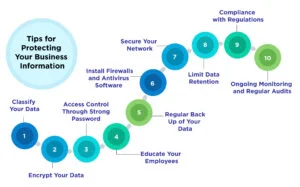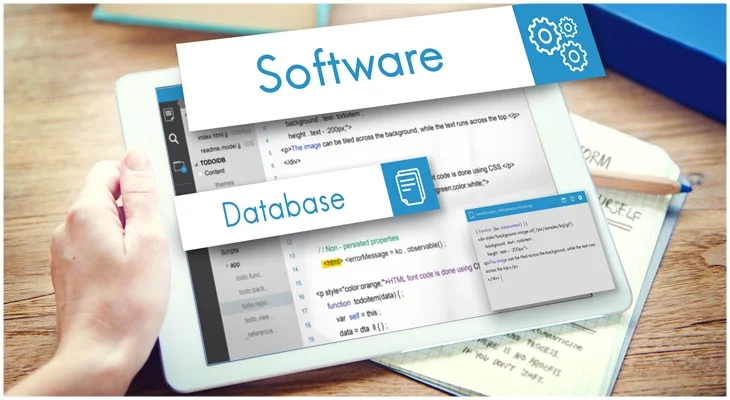Every business should ensure the safety of the sensitive data it handles. The online world transfers so much data every day that it comes along with some risks, including hacking and data breaching. Businesses need to take some crucial steps to win the trust of their customers if they have to keep such data. Customers are most likely to feel safe in giving out their information when they feel their data is secure.
Ensuring the safety of personal information is a common concern for all. But what is sensitive or confidential data? And how do businesses protect it properly? Let's understand what sensitive data is.
Understanding What is Sensitive Data-
Sensitive data is any crucial personal information such as security numbers, financial details, personal details, or any confidential business information like security plans or trade secrets. Improper handling of this information can cause harm to the individual or organization in terms of reputational damage, financial loss, privacy violations, operational disruptions, and many more.
Sensitive information is usually private and needs to be protected to keep it safe and secure. This type of data can include:
- Personal Identifiable Information or PII: Name, address, telephone number, Social Security number, and many more
- Financial Information: Bank accounts, credit card information, invoices, payment records, among others.
- Health Records: Test results, medical history, and other related information.
- Intellectual Property (IP): Trade secrets, strategies, and product designs used to maintain a competitive position.
- Employee Data: Remuneration details, performance assessments, and other sensitive employee information.
Pro Tips for Protecting Your Business Information
Now that you know what sensitive data is all about, let's dive into the best practices that might help you protect it for your business.
1. Classify Your Data
Regularly review the data and carry out data audits that your business collects and stores. Classify the data into categories, this helps in understanding sensitive data so that one can take necessary precautions to keep it safe.
2. Encrypt Your Data
Encryption is the best means by which sensitive information can be protected. As it transforms the given data into some code that can only be unlocked with a proper decryption key. So, whether it is storing the data or transferring it, encryption will restrict the hackers from intercepting and making sure the data is safe.
3. Access Control Through Strong Password
Access control is critical. Ensure that authorized users only access sensitive data, where these can be accessed using robust passwords and multi-factor authentication, MFA. Set password that is having combination of case, symbols, alphabets, and numbers.
4. Educate Your Employees
Human mistakes are the biggest cause of data breaching. Educate your employees on data protection. Ensure regular training to recognize phishing scams, the importance of having secure passwords, and responsibility for handling sensitive data wisely. This minimizes mistake cases and thus prevents potential security threats. It further helps to promote a security culture in the organization.
5. Regular Back Up of Your Data
To keep your data safe, try to do regular backups of the data. Make sure the backups are secure and stored at a remote place, preferably at a cloud-based service or on an encrypted hard drive. Test all backup systems at regular intervals and make sure that they will be safe and available when they are needed most.
6. Install Firewalls and Antivirus Software
Firewalls and antivirus software are your first line of defense against online threats. A firewall acts like a security guard that monitors the incoming and outgoing data of the network to block any harmful activity. On the other hand, antivirus software helps to identify and remove malicious programs, such as viruses and malware, that could be harmful to your sensitive information.
7. Secure Your Network
A safe network will help secure sensitive data. Encrypt your internet traffic, especially the connection of your remote workers, using a VPN. Encrypt your Wi-Fi and keep checking for unusual activities on it. Ensure to have a reduced chance of data breach with a secure network.
8. Limit Data Retention
The longer you keep sensitive data, the higher the chance of leakage. Always review and delete old or unnecessary data. A data retention policy can help you maintain only what is necessary for business operations and also follow data protection regulations.
9. Compliance with Regulations
Depending on your industry, there are certain rules that help to protect sensitive information. For example, businesses working in healthcare should follow the Health Insurance Portability and Accountability Act (HIPAA). Whereas businesses that deal with finance, especially businesses providing information related to credit cards, need to follow the Payment Card Industry Data Security Standard (PCI DSS).
10. Ongoing Monitoring and Regular Audits
It is important to audit your data security practices to ensure they are operating properly. Use monitoring tools to check the access logs and any form of suspicious activity or breach of security. The proper implementation of security policies should be under regular audits to ensure that policies are current and correctly enforced.
Concluding Words!
Protecting sensitive information is not just a legal obligation but a moral one as well. With these ten critical tips from data classification, encryption, access control, employee education, data backup, firewalls, securing your network, not keeping data beyond what's necessary, staying compliant, and auditing-follow you can build a strong security strategy for protecting your business and engendering credibility with clients.
Remember, to secure classified information is a continuous process. With changing technology, risk possibilities also change. Staying alert and proactive would best prepare your business to combat emerging data threats in the future.
To learn how to secure your data, visit us at KnowledgeNile!
FAQ
Q: What is sensitive data in data breaches?
Sensitive data in data breaches refers to personal or confidential information that can be misused if it falls into the wrong hands, like Social Security numbers or financial details.
Q: What are four types of sensitive information?
Four types of sensitive information include:
- Personal Identifiable Information (PII) like names and addresses.
- Financial information such as bank account numbers.
- Health records including medical histories.
- Intellectual property, like trade secrets.
Q: What is sensitive data in business?
In business, sensitive data is any important information that needs to be protected, such as employee records, customer details, and financial information, to prevent misuse and maintain trust.
Recommended for you:






